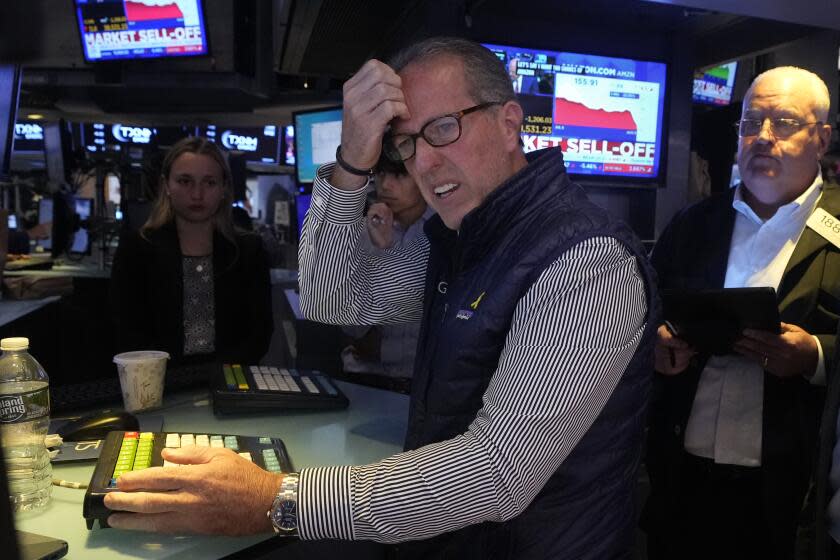
It’s nail-biting time on Wall Street.
Stocks had been falling at negative rates for several days, but on Monday things went from panic to panic. At one point, the Dow Jones industrial average fell more than 1,200 points, on a day when equity markets around the world were collapsing. It closed up 1,034 points, or 2.6%.
Technology stocks have been affected a lot lately: The Nasdaq composite, for a while on Monday, has fallen more than 10% since the middle of last week, entering the area that economists call “correction”.
The sudden move has unsettled investors and raised questions that go beyond financial markets to questions about the health of the economy.
Even when things are good, the collapse of the windows threatened to kill the political fun that has engulfed the Democrats since President Biden resigned and Vice President Kamala Harris emerged as the seed of the party.
So what happened and what might be next? Here are the first historical answers to some of the important questions:
What is causing the current downturn in the US stock market?
Economists point to several factors that led to the sell-off. First, technology stocks were overdone, pushed beyond their prime by artificial insanity. Hence, the Nasdaq correction. Nvidia, Apple and Intel were among the biggest losers on Monday.
And Friday’s jobs report, which showed a sharp decline in hiring and unemployment in July, put investors — even those not deep in technology — on edge. That came after news that jobless claims, a proxy for layoffs, rose sharply in the waning days of July.
It didn’t help that the Federal Reserve was reluctant to start cutting interest rates, which reduced inflation as intended, but also weighed on businesses and consumers.
And then there is the reverberation from the world markets. On Monday, high-flying Japanese stocks suffered their worst losses since Black Monday in 1987. The big losses were seen, in part, as a reaction to the decline in markets and growing concerns in the United States.
Christopher Rupkey, chief economist at Fwdbonds, a research house in New York, said: “It’s an unfortunate sequence of events that causes selling, selling, selling.
How have US stock markets performed overall this year?
Despite Monday’s panic sale, stocks are generally up for the year, with many rising.
Both the Standard & Poor’s 500 and the Nasdaq are still up more than 9% compared to the start of the year. The Dow is the laggard, up just 2.6% since January 2.
Stocks benefited from strong corporate earnings; investor excitement about the growth and potential of AI; and the prospect of Fed interest rate cuts, said Mark Zandi, chief economist at Moody’s Analytics.
“This is still, for now, a garden variety adjustment,” Zandi said of the current turmoil, though he added that the situation needs to be watched carefully. “Things can take care of themselves.”
Should I be worried about a recession?
Not now, maybe never.
The classic definition of a recession is two straight lines of decline in gross domestic product. The latest GDP, for the second quarter, after being adjusted for inflation, was a strong 2.8%.
Almost every economist agrees that you can’t have a recession without job growth turning negative for a long time. And the American economy is nowhere near that point.
Employers have added jobs every month since January 2021, as the economy begins to recover from the pandemic. Most recently, in July, job growth came in below expectations, but at 114,000 new hires, it was still positive.
“I don’t see any basis for a recession,” said Jack Ablin, chief investment officer and founding partner of Cresset Capital.
Is there anything that can be done to prevent the property from falling?
To stem the sell-off, some investors have urged the Fed to cut interest rates now, in an emergency fashion before the central bank’s next scheduled meeting in mid-September.
Fed officials have taken such steps before, during the pandemic and The Great Recession, for example. But analysts doubt policymakers will step in unless markets continue to wobble; making an emergency reduction can make things worse by scaring people and causing a market crash.
“Of course it’s not time to panic,” said Zandi.
What are the risks ahead?
With so many people close to the economy, a sharp decline in the stock market can undermine confidence among businesses and consumers, leading to a decline in hiring and spending. That may be intellectual progress, but economics is not immune to the fear or hope of their human parts.
Consumer spending, which drives the US economy, has held up well in recent years, thanks to job growth and stable incomes. But there are signs from companies like McDonald’s and Starbucks that consumers are becoming more cautious.
High-income households account for the majority of spending, supported by rising home and property prices. A sharp decline in stocks can have the opposite effect, the so-called negative wealth effect, by making wealthy households less likely to spend, which can lead to a recession.
Sign up for our Wide Shot newsletter to get the latest entertainment business news, analysis and information.
This story appeared in the Los Angeles Times.
#Trading #Wall #Street #Economy